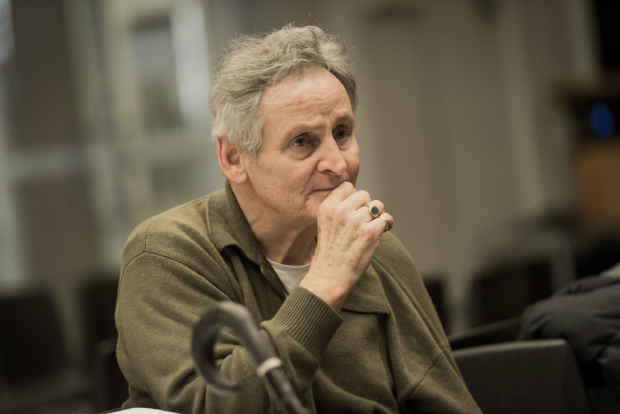Max Stafford-Clark: 'I had no vision for this play at all'

© Robert Workman
Samuel Beckett himself refused the rights to stage All That Fall to a number of distinguished directors including Laurence Olivier and Ingmar Bergman. He also declined an Alain Resnais film of it. It was written as a radio play and he wanted the voices to come as if from the void. So when his estate, which is the guardian of his work, called and said ‘What is your vision for the play?’ I knew that the right answer was that there is no vision at all.
The audience are blindfolded in this production. We have the actors walk through the middle of the audience, which sits either side of a walkway. At any one time you can have a performer sitting next to you or at a further distance. In Wilton’s Music Hall the actual stage becomes the platform for the railway station where Mrs Rooney is going to pick up her husband on a Saturday morning. The voices travel, as do the actors. The audience stay in one place.
The play is about two journeys – one to a station and one back from a station. The elderly Mrs Rooney leaves her home at Foxrock. Foxrock is now an urban suburb of Dublin but in 1956 when Beckett wrote the play it was way in the country. She walks to the station on a Saturday morning to collect her blind husband. The train is a bit delayed, there’s an accident on the line, she finally finds her husband and goes home with him. The mystery is that a little girl has fallen off the train and been killed and we never know whether Mr Rooney was a participant in this accident.
Our production is low tech. Dyfan Jones, our sound designer, is very skilled and he has speakers dotted round the space, so that if a train comes in to the station, for example, the sound moves from one set of speakers to another set of speakers in the direction of travel. But the show is very much dependent on the humanity, passion and proximity of the actors.
Beckett’s first stage directions are that there must be the sound of a cow, sheep, cock, lamb individually and then together. There is a real playfulness about All That Fall and I feel the way we are staging the production captures that. It is also a rather extraordinary experience having Mrs Rooney sitting next to you, telling you that she’s not going to take another step. So our staging offers the intimacy and danger of promenade performance, which I like very much.
Michael Billington included All That Fall in his volume of 101 Greatest Plays: not Waiting for Godot or Endgame. The play contains the usual Beckett tropes of disintegration and decay: Mr Rooney is blind and Mrs Rooney is overweight and has a walking stick. That’s offset by the playfulness and eccentricity of the production and the characters themselves. It isn’t as surreal as some of his other plays, although with that first stage direction, with all the cacophony of rural sounds, Beckett is definitely saying this is not absolutely real. It is a wonderful play that has great humour and compassion.
All That Fall runs at Wilton's Music Hall until 9 April.










